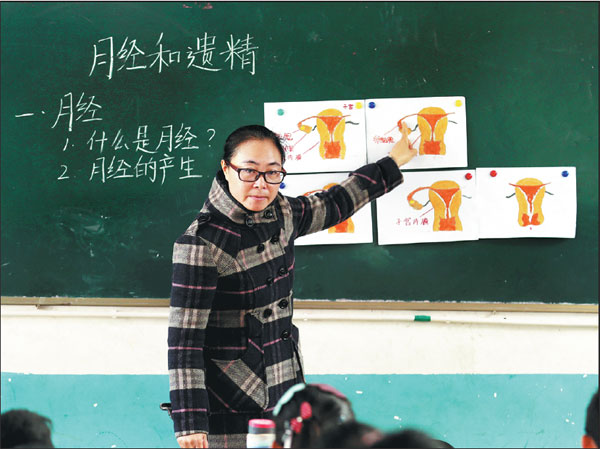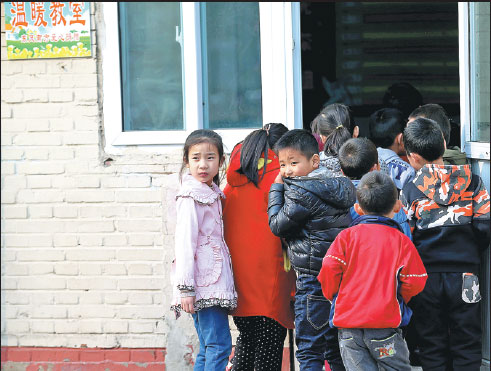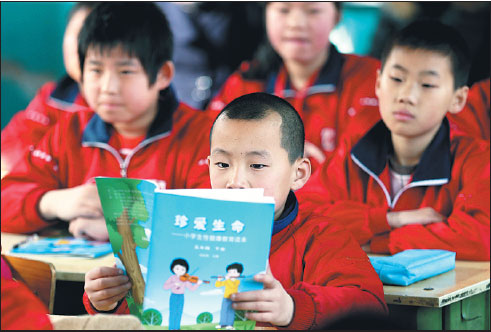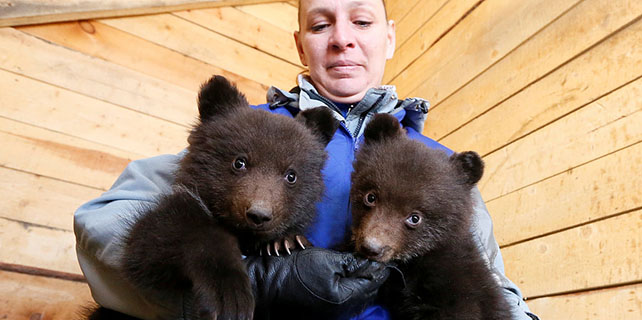Saying goodbye to the birds and the bees
Despite criticism that a sex education textbook is too graphic, parents and professionals have united in its defense. Yang Wanli reports.
"Every time I express my belief that sex education should begin at primary school level, many of my friends are stunned, almost open mouthed. They say 'Oh, my goodness! How can we allow these innocent kids to learn about sex?'" said Li Ming, a sex education teacher at Xingzhi Primary School in the Beijing's Daxing district.
Recently, the school has been targeted as a result of its use of a sex education textbook, even though it was published 10 years ago.
Some critics complain that the book is too graphic because it includes illustrations of genitalia, full penetration and menstruation.
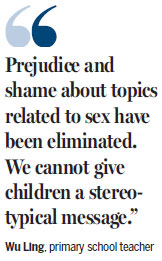
"Many people believe the stereotype that sex education is simply about sexual intercourse," Li said. In fact, the book's 12 volumes - whose collective name translates as Cherishing Life - are intended for students from grades one to six. The books cover six themes, including family and friends, life skills, gender and rights, sexuality and healthy behavior.
Despite widespread support for the book, some parents remain unconvinced.
"Some knowledge of sexual activity and contraceptives is included in the textbook for children at grades five and six. I'm concerned that knowing this sort of information will encourage children to try sex even earlier," Apple, the mother of a 3-year-old girl, wrote on her Weibo account.
A child's right?
Since its launch, the textbook, written by academics at Beijing Normal University, has been used in 18 primary schools in Beijing to teach about 15,000 children ages 6 to 11.
Liu Wenli, the book's lead author, has specialized in child development and sex education since the 1980s.
When she returned to China after studying and working in the United States for 10 years, she was enthusiastic about promoting sex education.
"Unlike some people who view sex education simply as the prevention of unplanned pregnancies, sexual activity at a young age and sexually transmitted diseases, I believe sex education is a child's right. Children have the right to learn and know more about themselves and other people," she said.
"This not only answers fundamental questions, such as 'Where am I from?' but also provides the basis for developing mutual respect with other people and a tolerance of differences."
The heightened public and media discussion about the textbook has resulted in a growing number of parents visiting bookstores to buy it.
Liu recently received a message from the publisher informing her that it is printing extra copies in response to the growing demand.
Safety issues
In May 2007, Liu's team launched sex education classes at Xingzhi Primary School, a private establishment for the children of migrant workers in Beijing.
"Home visits we conducted revealed a number of problems or threats to the health and safety of that group of children. Some students were extremely aggressive as a result of a lack of parent-child time, while others were living in poor conditions with sanitation problems and safety risks," said schoolteacher Shen Guixiang.
A small number of the students live with their grandparents, who don't know how to discuss sexuality and are unable to provide guidance.
Shen recalled visiting a 12-year-old girl whose mother had died. The girl was living with her father in a dormitory for construction workers, and sleeping in the same room as several adult males.
"After I left, I couldn't sleep. She might have been sexually assaulted at any time. I knew we should do something before anything awful happened," she said.
Liu has conducted research among parents and students. About 15 percent of parents said they had discussed sex with their children, but they only focused on puppy love and how to deal with it.
When Liu interviewed a number of junior high school students, she was astonished by their ignorance.
"Some girls said they could get pregnant after sitting on a seat that had recently been occupied by a boy, while others said kissing or sleeping in the same bed could also result in pregnancy," she said.
The lack of sexual knowledge at an early age can lead to problems such as bullying, which can occur when children hit puberty, she said.
According to Liu, the mental functions of pubescent children develop rapidly, which can result in instability.
Therefore, children need support from adults they trust, and talking about sex at an early age can be beneficial because it can establish close relations between children and their parents.
Moreover, LGBT children are often targeted by bullies. "That's why I suggest that children should be introduced to sex education classes as early as possible, because they will understand the concepts of equity and mutual respect at an early age," she said.
Crucial role
Teachers play a crucial role in sex education. The entire process - from training teachers to pre- and post-class interviews with students, to teaching plans - is under the guidance of Liu's team.
"Prejudice and shame about topics related to sex have been eliminated. We cannot give children a stereotypical message," said Wu Ling, who has taught sex education at Xingzhi Primary School for six years.
She said Liu's methods include loudly reciting the scientific names of the reproductive organs, which are usually described in euphemistic terms.
Lively learning methods are encouraged, and classroom activities include discussing the illustrations, telling stories, asking questions and sharing ideas.
The teachers invite the students to invent role-playing scenarios to hone their abilities to deal with a range of situations and problems.
Students are also encouraged to conduct research at home, such as finding out how their parents met and how they formed their family. These 'family stories' are then shared in class.
Before the start of each class, Wu carries out a survey of the content she will teach.
A recent course focused on menstruation and nocturnal emissions.
Among the 46 students in her fifth grade class, the parents of just five of the girls had explained the basics of sex, and only one boy said his father had spoken to him about nocturnal emissions after finding a stained bed sheet. "The father simply asked his son not to tell anyone else," Wu said.
Ge Yaqing, who graduated from Xingzhi Primary School in 2015, is one of the few school students in China to have received systematic sex education for six years.
The 14-year-old is now a senior student at the Gu'an No 2 Primary School in Hebei province.
She said fewer than 10 of the more-than 1,300 students in her grade received sex education in primary school.
"Many of my classmates didn't know how to ease menstrual pains, and some had even called paramedics. They believe sex should not be discussed at any level," she said.
"When I taught them the right way to handle menstruation and nocturnal emissions, they were astonished and asked why a primary schoolteacher had taught us such things. They wanted to know why we weren't ashamed to talk about it."
Changes
In recent years, Wu has witnessed the development of her students, who are no longer ashamed to ask questions about their physical changes or their confusion about close relationships with friends and parents.
"After we were given this semester's sex education textbook, one boy asked whether we could talk about the topics openly, because he thought some of the content might be too 'sensitive' for the older generation," she said.
Wu's daughter is a fifth grade student at Zhongguancun No 2 Primary School, which doesn't provide sex education classes and none of its teachers specialize in the subject.
Wu has been invited to give lectures at the school several times.
"It's not just migrant children; all children, and their parents need to know about this. Most parents have positive attitudes. It's very important to get parental support for sex education in schools. School time and parent-child time are both important. Only open attitudes will allow children to discuss sex with their parents," she said.
Removing taboos
Liu said children's cognitive abilities are different from adults, which is why the textbook uses illustrations of reproductive organs and emphasizes their scientific names.
"Kids will simply see all this as knowledge and science," Liu said, adding that studies in several countries have found no negative influences on children who received sex education at an early age.
"Taboos about sex result in concerns for some parents, and those taboos should be removed," she said. She also stressed the importance of the parents' role in sex education.
"Only by seeing the world from a child's perspective and throwing stereotypes away, will parents know how a child looks at and learns from the world."
Stereotypes
In January, the journal Science published research about gender stereotypes.
It found that intellectual ability emerges early and influences children's interests, indicating that stereotypes are endorsed by, and influence the interests of, children as young as 6.
In 2013, Liu's team launched a pilot sex education program in kindergartens based on guidance from the World Health Organization. Textbooks for children in kindergartens are still being written.
In 2015, a pilot project for junior high school students was also initiated.
"I wanted the textbook to not only be taken as a promotion of health-related information, but also to help children grow up with a positive life attitude and an open view of the world," Liu said.
Tang Yue contributed to this story
Contact the writer at yangwanli@chinadaily.com.cn
|
Wu Ling, a sex education teacher at Xingzhi Primary School in Beijing's Daxing district, teaches her students about women's bodies and menstruation.Photos By Zou Hong / China Daily |
|
Students during a break at Xingzhi Primary School. |
|
A boy consults the controversial sex education textbook. |
(China Daily USA 04/17/2017 page6)



